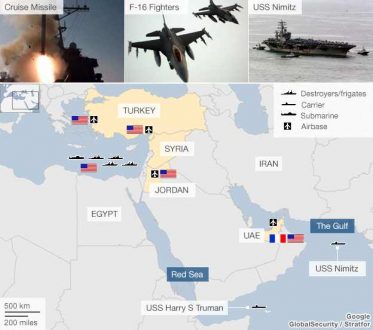Syria intervention debate: The world’s media reacts
“The British aren’t coming! The British aren’t coming!” screams the headline of New York’s Daily News, describing Britain as “normally reliable” but now a surprising let-down for U.S. President Barack Obama.
Following a lengthy debate in the UK parliament Thursday, a majority voted against the government’s motion to militarily intervene in Syria in response to an alleged chemical attack by the Assad regime.
The result of the emergency meeting has been described in the press as a humiliating defeat for both UK Prime Minister David Cameron and Obama.
The New York Times says Cameron’s intentions were hasty and the result of the vote was a “blow” to the U.S. president.
“Like nearly all presidents since the Vietnam War, he has relied on Britain to be shoulder-to-shoulder with Washington in any serious military or security engagement,” it said.
Writing for Canada’s National Post, author Kelly McParland criticizes U.S. President Barack Obama’s approach as slow and indecisive. “Syria’s government can only feel fortunate that so grievous a violation of international norms has provoked so uncertain and disjointed a response,” she concludes.
Al Jazeera reports UK finance minister George Osborne’s view that the result will diminish Britain’s position in the world and fray the bond it has with the U.S.
Russia’s weekly newspaper the Moscow News says the debate is “a stunning defeat” for Cameron. They also add that the White House has said Thursday’s U.N. Security Council permanent member meeting, which failed to reach a conclusion, was another effort by Russia to not hold the Syrian regime accountable for the use of chemical weapons.
Russia’s English-speaking daily, Moscow Times, says there are eight issues that must be considered before carrying out an attack on Syria. It says the main point is that Western leaders are not thinking about the bigger picture, such as whether military intervention will actually prevent further use of chemical weapons. The paper also suggests pushing for diplomatic instead of military resolutions.
The BBC’s political editor Nick Robinson writes: “The prime minister has lost control of his own foreign and defence policy and as a result he will cut a diminished figure on the international stage.” He adds that the prime minister’s defeat will be mostly felt within his own party.
UK’s daily newspaper The Independent said Cameron’s military plans were “shot down in a dramatic Commons vote” and that “foreign policy is in disarray.” It adds that the prime minister’s “humiliating defeat” questions his leadership. The paper also claimed the loss was a win for opposition leader Ed Miliband, who supported military intervention but then spoke firmly against it.
According to the paper, some Tory ministers were quite confused. In the British political television program Newsnight, Defence Secretary Philip Hammond twice referred to the need to deter “Saddam Hussein” from chemical warfare.
British tabloid newspaper The Mirror also claims that UK politicians cannot pin Damascus on a map. “One person picked Texas – hopefully they were joking,” quips the paper.
Britain’s Daily Mail newspaper suggests Cameron has shot himself in the foot, describing him as the “Grand Old Duke of York” attempting to march his men to the top of the hill. “He now discovers that he has charged up his own hill while the majority of the British people and indeed a majority of their MPs remain stubbornly at the bottom.”
Time Magazine reminds readers in its blog that the British government’s desire to take action in Syria is nothing new, including numerous warnings to Syrian President Bashar al-Assad to stop attacks on his own people.
French news outlet France 24 expresses shock at the result of the vote, claiming that the nation’s President Francois Hollande will maintain his firm stance in support of military intervention. Unlike in the UK, the French leader does not need a vote in parliament to back his actions.
Hollande is also quoted as saying that Britain’s agreement is not needed: “Each country is sovereign to participate or not in an operation. That is valid for Britain as it is for France.”
The South China Morning Post in Hong Kong reflects on the Iraq War — the memory of which clouded the debate in parliament and gave rise to concerns from politicians who remember the invasion only too vividly, it says.
However, unlike the uncertain grounds of that war, the paper points to the strong evidence of the use of chemical weapons. “Unlike Iraq in 2003, the triggering event in Syria a decade later is not a shaky argument that the government possesses weapons of mass destruction, but a rocket assault that left hundreds of victims convulsing and gasping for breath, glassy-eyed and foaming at the mouth — all classic symptoms of a reaction to poison gas.”
However, some feel excluded from the debate altogether. The online version of the Israeli Haaretz Newspaper claims that Israel should have been a part of the discussion: “During the lengthy debate in the British parliament over a possible military intervention in Syria on Thursday, Israel barely featured.”
cnn


